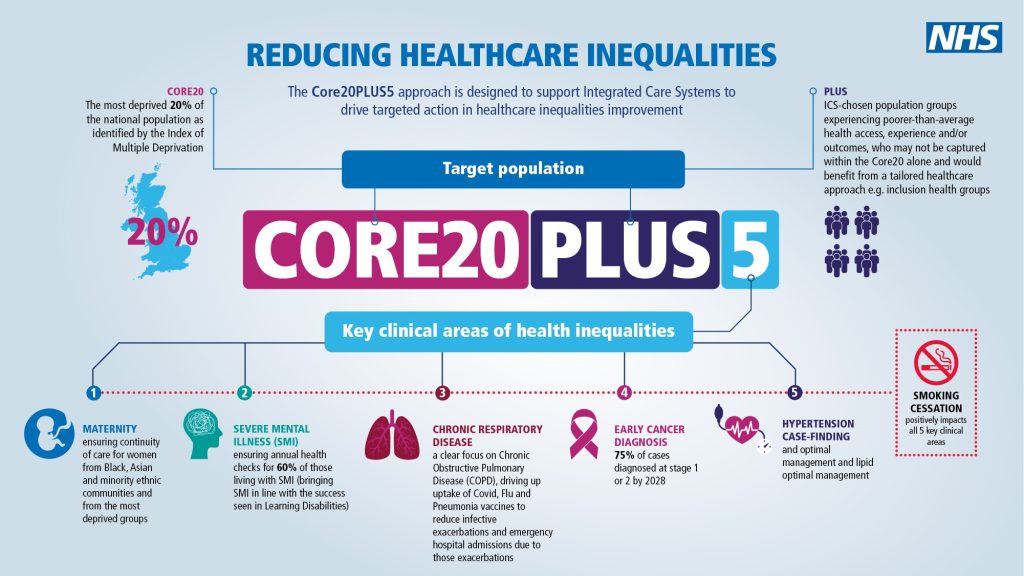
#NarrowingTheGapMSE
Dr Sophia Morris, System Clinical Lead for Inequalities and national Core20PLUS5 Ambassador.
Mid and south Essex is a diverse place, which is reflected in our diverse and colourful communities and within our growing population. The recent 2021 census showed that our population has grown by over 6 per cent since 2011, reaching around two million, with 44 per cent between 70 to 75 years old and 28 per cent over 90 years old.
Whilst it’s great that people are living longer, it’s important that as we strive for an increase in life expectancy, we consider quality of life and look to increase healthy life expectancy across all our communities. Unfortunately, this is often not the case, as health inequalities mean that those with limited resources, economic opportunities and less social connections will suffer poorer health outcomes.
Women living in the most deprived areas are twice as likely to die than those living in the most affluent areas.
Saving Lives, Improving Mothers’ Care 2021 report
Working in Partnership to reduce inequalities
Our resident’s poor health and early (premature) death can be tackled through collaboration and innovative approaches to narrowing the gap on health inequalities. Mid and South Essex Integrated Care System is working with Primary Care Networks (PCN), Alliances, Essex County Council, Southend City Council and Thurrock Council, to improve their resident’s health through reducing inequality, as well as creating a fair, accessible and inclusive place where people feel invested in, valued and nurtured, now and in the future.
Connecting with communities
We are proud to be now have across mid and south Essex, we have Core20 Community Connectors. These are people with influence in their community who can help engage local people with health services. They will work across the integrated care system and with key decision makers, offering their unique insight into the barriers people living in their communities’ face. Community Connectors are ideally placed to advise local NHS services on how we design services which are accessible and provide a positive experience.
The Community Connectors are focused on the experience of residents living with COPD in areas of deprivation. This is one five targeted areas with the NHS Core20PLUS5 national framework:

Core20PLUS5 framework has been developed to support the reduction of heath inequalities.
Core20Plus5 reducing Health Inequalities areas:
- Maternity Care,
- Severe Mental Illness,
- Respiratory Disease,
- Cancer,
- Cardiovascular Disease.
You can read about it here.
Taking vaccines into communities
The COVID-19 pandemic really shone a light on significant and longstanding differences across our society that disadvantages particular individuals and communities. We saw, groups suffering disproportionate deaths, because of their health, living and working conditions.
We have learnt that there are challenges to some communities in getting vaccinated. These included barriers in accessing health and care services. We, therefore, needed to come up with innovative way to physically get to these communities. A partnership between Ford and Mid and South Integrated Care System enabled a vax van to be set up and work in places with low vaccine uptake, including rural and traveller communities.
The power of the individual and community
Turning Corners Community Football
Another example of a grassroots community project reaching out to specific members of our community is Turning Corners, a football club in Thurrock for individuals with substance abuse and gambling issues. Chris Shields, the founder of Turning Corners, received help from health and care organisations including Thurrock Council, to recover and turn his life around and has used his experiences to help other in his community.
Chris’ story really highlights the power an individual can have on a community, as they often have a better understanding of what their communities needs to make them healthier, stronger more resilient places to live.
Read about Chris’ story here
Neonatal voices
Maternal mortality was more than four times higher for Black women, two times higher for mixed ethnicity women and almost twice as high for Asian women
Saving Lives, Improving Mothers’ Care 2021 report
We’re also working with the Mid and South Essex Maternity and Neonatal Voices Partnership (MNVP) on a project for ethnic minority background groups, to help shape our local maternity services. The MNVP include parents, clinicians and people interested in maternity services, who want to make a positive change to the services offered locally. They are looking for people to get involved, so if you’re interested in getting involved click here.
Grants to help reduce health inequalities
Microgrants
If you are part of a community of voluntary organisation, you apply for a new micro grant programme to help address health inequalities and the wider determinants of health within your local area.
Find out MoreEssex Community Foundation Grant
There’s funding available, from the Essex Community Foundation (ECF), to support marginalised communities and address health inequalities for people who have mental health problems. If you are a charity community group working within the mid and south Essex footprint.
Find out moreOther blogs from our #NarrowingTheGapMSE campaign